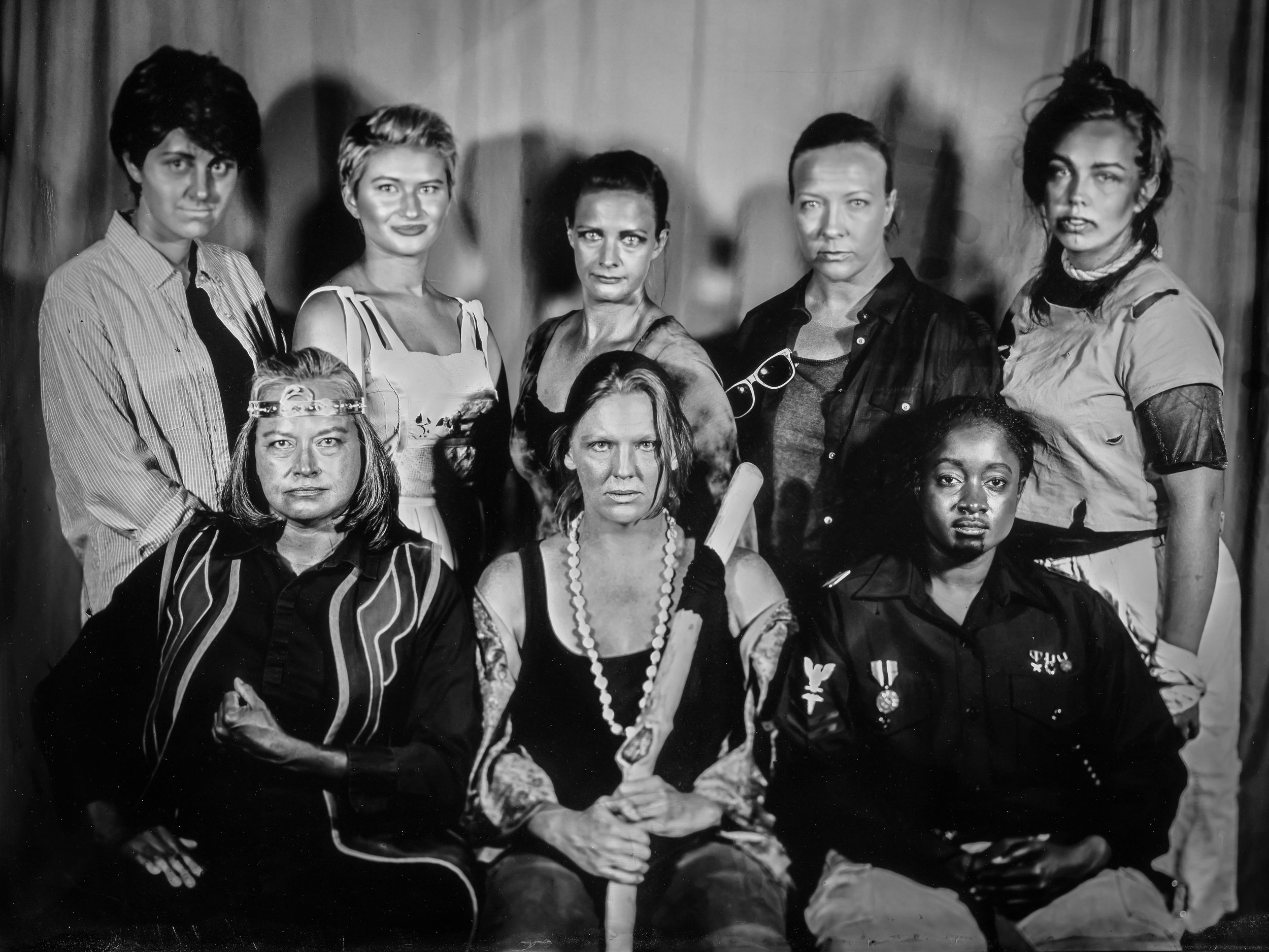By Sean Hargadon
For some years now, I have been intrigued by the idea of bootleg, unrehearsed, cue script Shakespeare. There are different names for it, and you will find a small selection of groups across the country practicing some variation of it. Our version of this practice stems from the Patrick Tucker, Demitra Papadinis, Bill Kincaid line. Each practitioner has further developed and elaborated on the idea and concepts of cue script performance.
The cast of the Tempest Unrehearsed. Front row from left is Lori Holm, Jennifer Reeves-Wilson and Amber Cartwright. Back row from left is Paula Smiech, Annalise Palatine, Julie Bayer, Heidi Swarthout and Allison Sword. Tintype photo courtesy of Doug Hanson.
One thing that struck me about our recent weekend with the Tempest was how pliable the play was regarding different actor interpretations. Since this production was not directed in the usual way, the actors were making choices in the moment. And while an actor could possibly attempt to play a character arc throughout the performance, they still had to be open immediately to what was happening around and right in front of them. There are no tracks to follow, the play is not blocked in advance, character work is done in isolation away from other actors, so it leaves a lot open inside the arena of the playing space, the audience, and the actors.
I have witnessed the Tempest performed in ways that promotes a certain tone of seriousness to the proceedings. Prospero is usually a sage-like figure, full of wisdom, stature, anger and the like. His daughter comes off as demure and pure. And in most cases, the majority of the comedy rests with the clowns played by Trinculo and Stephano.
But in our unrehearsed production this idea was turned on its head. Throughout much of the play, there was a tremendous amount of amusing exchanges taking place between the actors and the audience, since one of the rules in this style is to keep talking to the audience as much as possible. Along with this comes a fluidity of movement where actors are countering and crossing much like a basketball team as each player keeps working for the good shot. In this case, actors are creating a physical rhythm with each other through the language, while still trying to connect and engage the audience. This isn’t park and bark Shakespeare.
Some moments that stick out in my mind came in the opening scenes when Prospero has to go into a lengthy exposition about past events. He is bringing his daughter up to speed and repeatedly gets frustrated because he thinks she is not paying attention. Instead of this scene strictly happening between two actors, the audience surrounding the action became active participants as Prospero began questioning them to see if they were listening as well. Add to this the support of Ariel asking audience members to ‘hail’ Prospero in the beginning of the scene, it becomes clear this reading of the play will be somewhat different. Later, in a scene between Miranda and Ferdinand; a love scene that is often played very proper and sweet, Miranda quickly falls for this shipwrecked prince and has no problems showing it verbally and physically. Watching this was quite shocking at first, as one actor pursued another, but after checking the script, the language did support the acting choices.
This led me to think about how much cultural baggage is associated with Shakespeare in performance nowadays. What is common practice, what is the right way to do it, and can you veer off in other directions? Well, the answer is you can attempt many different things and the play can support it. But you have to be willing to break free of years and years of interpretation. That’s not an easy task and the director inside me kept questioning what I was seeing.
This style of playing tends to open up the play in ways that feels more fun, a bit loose, and less precious. But the genius in this approach comes when you’ve reached Act 5 and most of the play has gone on with a fairly light touch and you’re wondering to yourself: “Where is this going?” and “What’s so special about this play?” That’s when Shakespeare brings all the resolutions together in a few short pages and Prospero’s performance begins to morph into something quite magical. The act of forgiving your brother for his crimes; the decision to let your daughter marry her love; the gratitude you feel toward Ariel and pain in letting her go; and the forgiveness you apply to the beast that is Caliban – all this comes on like a rising tide that threatens to overtake the play in a wave of dignified yet painful, but still joyous emotion. It’s a conjuring of sorts (something that actors can do) that doesn’t require fancy lighting or a clever soundtrack, save maybe for a percussion instrument and a singing bowl.
It all ends with Prospero turning to the audience and then setting his sights on one person in the audience, a young man, who has been watching in agreement at this intimate spectacle. Prospero delivers the lines of his famous final speech and with a gesture of two hands coming together he almost simultaneously forms an embrace and clap as he asks the audience to set him free. And they do. The applause comes and the story ends.
That’s when I realize I’ve just gone 15 rounds watching a Shakespeare play where he danced and weaved and boxed his way into my heart and mind, before knocking me on my ass with a sharp uppercut. It was totally unexpected and worth the wait. And it wasn’t precious or pretentious or planned. Now, that is some rough magic.
